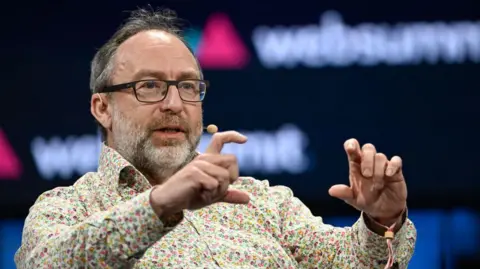Wikipedia is embroiled in a major legal battle in India that experts say could impact how the online encyclopaedia functions in the country.
The battle stems from a 20m rupee ($237,874; £183,012) lawsuit filed by India’s largest newswire service against Wikimedia Foundation, which runs Wikipedia, for allegedly publishing defamatory content against it.
In the lawsuit in the Delhi high court, Asian News International (ANI) said a paragraph in its description on Wikipedia falsely accuses it of being “a propaganda tool for the incumbent [federal] government” and of “distributing material from fake news websites” and demanded the page be taken down.
Wikipedia says the content on the website is completely managed by volunteers and that the Foundation has no control over it.
In August, the court ordered Wikipedia to disclose who made these allegedly defamatory edits to the ANI page – and threatened to shut down the website if it didn’t comply with its orders.
The hearing is still on, but Wikipedia has since agreed to share basic information about the users in a sealed cover to the court, though it’s not clear what that would be.
Experts say the case is an important one as its outcome could impact people’s access to neutral information on the platform.
“It will tell us whether India lives in the era of the internet, where information is truthful and free for everybody to access,” says technology law expert Mishi Choudhary.
What is the case about?
The hearing began in July after ANI petitioned the court, saying it had tried to change the allegedly defamatory material on Wikipedia but its edits were not accepted.
The ANI page was put under “extended confirmed protection” – a Wikipedia feature used to stop vandalism or abuse – where only users who have already done a certain number of edits can make changes to a page.
In its lawsuit, ANI demanded that the allegedly defamatory content be taken down. However, it has not sued the news reports that are cited in the Wikipedia page.
Wikipedia, in turn, argued that despite being a community-driven platform, it had a robust fact-checking system.
Wikipedia works on a self-regulation model, where anyone can make edits on a page as long as it is backed by a published authentic source and written from a neutral point of view – this means no-one can add new, unpublished information on Wikipedia.
There are volunteers on the website who edit and verify information, while maintaining their anonymity.
Any debates among volunteers about the edits are visible for everyone to see on the page. In case of disagreements, there are guidelines on how to resolve disputes. The website also uses bots to keep track of the changes.
 Getty Images
Getty ImagesIn court, the Wikimedia Foundation said that it only provided technical infrastructure and had no relationship with the volunteers who manage content on the website.
But this model came under scrutiny after a page on the ongoing court case appeared on Wikipedia.
Last week, the court ordered it to be taken down saying it interfered with court proceedings.
The Foundation has since suspended the page. Observers say this is probably the first time that a Wikipedia page in English language has been taken down after a court order.
Transparency reports published by the Foundation since 2012 show that in about 5,500 content takedown and alteration requests globally, it had complied with less than 10, and none of them were for the English website.
The move was criticised by some digital experts who said it was wrong to take down the page as it collated what the press had been reporting on the case.
What is at stake?
Simply put, a lot.
Experts say that the outcome of the case is likely to have significant ramifications for the platform’s operations in India.
Tech journalist and digital rights expert Nikhil Pahwa fears that the case may encourage more people and brands to start controlling their Wikipedia pages.
“Many people do not like how they have been portrayed on Wikipedia. Now anyone can file a case, ask for identification of editors and the court might grant it without any preliminary determination of whether there was defamation,” he says.
Ms Choudhary says the case could have a “chilling effect” on free speech as editors might hesitate to write truthful content.
Any form of self-censorship could also seriously hamper access to neutral information about a subject on the platform, she adds.
Of course, Wikipedia is no stranger to controversy. It has faced various forms of censorship in at least 13 countries. China banned it in 2019 and Myanmar in 2021.
It has also had run-ins with the Russian government and courts. Moscow has blocked several pages critical of the government and courts have fined the Wikimedia Foundation for its refusal to remove these articles.
In 2023, Pakistan blocked the website for three days after it did not remove allegedly “blasphemous content”.
Wikipedia was blocked in Turkey in April 2017 after it refused to delete articles critical of the country’s government. Turkey’s top court lifted the ban in 2020.
In India, experts say the platform is one of the few organisations that has pushed back against the federal government’s orders to take down content.
But a ban could seriously derail its operations in the country.
If the verdict is not in Wikipedia’s favour, “we as a society will suffer since we will not have access to impartial information”, Ms Choudhary says.
















Leave a comment